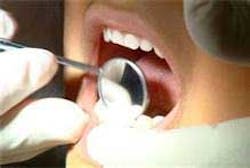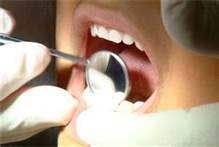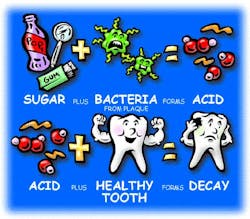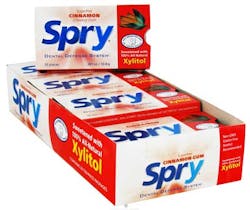Bad things happen when spit hits the fam'
Delta Dental cautions parents about passing decay-causing bacteria to their children Edited by Maria Perno Goldie, RDH, MS Most parents don't know they can pass harmful bacteria from their mouth to their baby's mouth, which can put their child at an increased risk for cavities.
It's no secret that poor nutritional habits in children are a serious problem in this country. According to studies from the National Institute of Health, the average American eats about 147 pounds of sugars a year, and the average 17-year-old has more than three decayed teeth!
In fact, less than a third of American caregivers (32 percent) realize they can pass dental disease to their baby. That's one of the key findings from a survey of American children's oral health, conducted on behalf of Delta Dental Plans Association, the nation's leading dental benefits provider.(1,2) Most people know that the bacteria in the mouth that causes tooth decay can be transferred from person to person. This is most likely during a child's first two and one-half years of life. Tooth decay causing bacteria called Streptococcus mutans are passed when items contaminated with saliva go into a child's mouth. Typically, this takes place through common parental behaviors, such as sharing eating utensils or using ones mouth to clean a baby's pacifier. Research shows that moms play a primary role in passing bacteria but other non-family settings like day-care centers also play a role.(3,4,5) Caregiver behavior reflects a lack of knowledge about passing on bacteria that can lead to dental disease. Nearly two in every five (37 percent) Americans say they sometimes or often share utensils with their children. Caregivers of children ages 2 to 3 are most likely to share utensils with their children. "Babies are actually born without any harmful bacteria in their mouths. But once bacteria colonize in the mouth, your child will be more prone to cavities in baby and permanent teeth," said Dr. William Kohn, DDS, vice president of dental science and policy for Delta Dental Plans Association. "If you have a history of poor oral health with frequent cavities, you're particularly likely to pass the germs along." Delta Dental Plans Association offers these tips to help caregivers protect their children's teeth: • Make sure to keep your own mouth healthy. It's never too late to begin good oral health habits. Maintain a good diet, brush your teeth with fluoride toothpaste at least twice a day and floss at least once a day. Visit the dentist regularly and have any cavities in your own teeth repaired. • Try to cut back on or eliminate saliva-transferring behaviors—such as sharing utensils and toothbrushes, and cleaning off your baby's pacifier with your own mouth. • Mothers and expecting moms who already chew gum should chew gum sweetened primarily with xylitol. A recent study found that children of moms who chewed xylitol gum (starting in the sixth month of pregnancy) were significantly less likely to have decay-causing bacteria in their saliva.(6)
If you follow these tips, you can ensure that you will be passing along good oral health habits—not harmful bacteria—to your children. To see a video on this topic, go to the referenced website.(7)References 1. http://www.deltadental.com/Public/NewsMedia/NewsReleaseBadThingsHappen201108.jsp. 2. Morpace, Inc. conducted the 2011 Delta Dental Children's Oral Health Survey. Interviews were conducted by email nationally with 907 primary caregivers of children from birth to age 11. For results based on the total sample of national adults, the margin of error is +-3.25 percentage points at a 95 percent confidence level.http://www.youtube.com/watch?v=Sblg73yx5vM&feature=channel_video_title. 3. Mitchell SC, Ruby JD, Moser S, Momeni S, Smith A, Osgood R, Litaker M, Childers N Maternal transmission of mutans Streptococci in severe-early childhood caries. Pediatr Dent. 2009 May-Jun; 31(3):193-201. http://www.ncbi.nlm.nih.gov/pmc/articles/PMC3173944/. 4. Alves AC, Nogueira RD, Stipp RN, Pampolini F, Moraes ABA, Gonçalves RB, Höfling JF, Li Y, and Mattos-Graner RO. Prospective study of potential sources of Streptococcus mutans transmission in nursery school children. Med Microbiol April 2009 vol. 58, no. 4, pages 476-481. 5. Law V, Seow WK, and Townsend G. Factors influencing oral colonization of mutans streptococci in young children. Australian Dental Journal. Volume 52, Issue 2, pages 93–100, June 2007. http://onlinelibrary.wiley.com/doi/10.1111/j.1834-7819.2007.tb00471.x/abstract. 6. http://www.youtube.com/watch?v=Sblg73yx5vM&feature=channel_video_title. 7. Nakai Y, Shinga-Ishihara C, Kaji M, Moriya K, Murakami-Yamanaka K, and Takimura M. Xylitol Gum and Maternal Transmission of Mutans Streptococci. Journal of Dental Research. JDR January 2010, vol. 89: 1, pages 56-60.
Additional Reading (per Editorial Director):
1. Hurlbutt M, Novy B, Young D. Dental Caries: A pH-mediated disease. CDHA Journal, Winter 2010. http://carifree.com/dentists/science/documents/DentalCariesapHMediatedDisease.pdf.
2. IHS Headstart. Oral Health for Head Start Children: Best Practices. http://www.ihs.gov/headstart/documents/OralHealthBestPractices.pdf.
3. Mom's kiss can spread cavities to baby. http://www.msnbc.msn.com/id/35989527/ns/health-oral_health/t/moms-kiss-can-spread-cavities-baby/.
To read more about tooth decay, click here and here.




